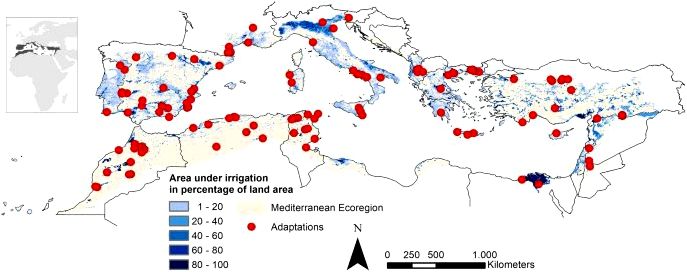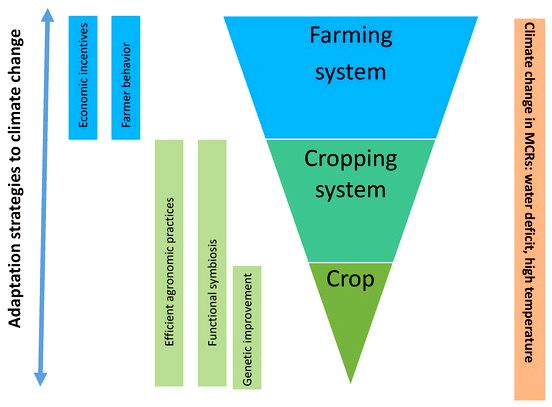
March 24, 2016
by Asociacion RUVID
Corentin Girard, investigator in the Polytechnic College of Valencia’s Research Institute water and Ecological Engineering (IIAMA-UPV), is promoting a cutting-edge methodology to help planning in the proportions of the forest basin in times of uncertainty for example individuals brought on by global warming.
The paper, printed in Global Ecological Change, is the effect of a research study made to establish selection criteria when selecting what global warming things to do, according to economic and ecological concepts.
Evaluating all options before starting costly projects
By way of an optimisation model, the machine selects the very best mixture of actions in line with the nature from the basin, demand planning forecasts, economic factors and various plausible global warming scenarios.
The model highlights the benefits presented through the different measures made to enhance the efficiency of irrigation channels for agriculture or consuming water systems when it comes to remarkable ability to assist face an uncertain future.
Girard comments: “It’s important to judge the entire spectrum of options before applying actions that need significant investment, for example building desalination plants or performing water transfers, to prevent regretting the choice afterwards.”
Making certain supply of water for those users
The work aims to make sure lengthy-term supply of water for those users, while keeping an account balance between sources, demand and also the impact from the measures taken.
For this finish, Girard informs us that various adaption action plans were evaluated against different possible scenarios, ultimately “defining a comparatively low-cost plan of action that’s robust when confronted with global warming.”
Methodology
The methodology developed enables study regarding tradeoff solutions between different planning objectives, for example environmental flows, irrigation development, guaranteed supply for urban demand and the price of the plan of action.
Similarly, the interdisciplinary framework developed integrates a cutting-edge, top-lower perspective, where the different possible courses of worldwide global warming as well as their impacts on river basins in the local level are evaluated from the bottom-up perspective, which enables different scenarios water demand and native adaptation measures that need considering, as defined together with people that use the basin via participatory workshops.
Situation Study: Orb river basin, France
The job is dependant on study regarding the Orb river basin, which flows in to the Mediterranean And Beyond in Valras-Plage, located between Montpellier and Perpignan.
Various studies agree the regions round the Mediterranean And Beyond is going to be considerably influenced by global warming, although there’s no agreement around the severity that the location is going to be hit. This will make action plans very necessary, “since future is really uncertain,” the IIAMA-UPV investigator warns.
Participation of stakeholders within the decision-making process
Among the primary contributions of Girard’s model may be the participation from the different stakeholders within the decision-making process. “It’s interesting to construct consensus in line with the proposals of irrigators, water companies, governments and individuals living in the region. Everybody has something to state,” he states, adding that in this way the pilot study continues to be very useful.
“The manager from the Orb river basin explained that there’s growing discuss global warming, however that they still don’t know how you can face this issue in most its complexity. What we should did it to give them something that permits them to discuss the long run having a view to preparing the perfect solution, and continue residing in their region,” Girard explains
In connection with this, in france they investigator states, “You need to make certain that there’s no social conflict. You may devise a great plan, but when nobody is prepared to carry it out, it’s useless.”
Ultimately, adaptation to global warming is really a challenge to traditional water resource planning and management approaches. For the moment, this research is definitely an innovative contribution towards the arduous task of tackling the brand new ecological challenges society faces.
Implementation of the model within the Júcar river basin
Because of its part, the study group concentrating on Hydro-Economic Models for Water Resource Engineering at IIAMA-UPV, coordinated by Manuel Pulido, is focusing on the introduction of methods and systems for decision-making and support for that integrated, sustainable and efficient control over water sources, mixing financial aspects, systems analysis, hydrology, agent modelling and public participation.
Particularly, it’s creating a methodology much like that implemented within the Orb river basin for that river Júcar included in a nationwide multidisciplinary research study coordinated through the UPV referred to as IMPADAPT (Methodologies and tools for analysing impacts and adaptation to global change on water resource systems).
Explore further
Waterflow and drainage in Mediterranean rivers will fall by 34 percent through the finish from the century
Citation:
New methodology for adapting Mediterranean basins towards the demands of global warming (2016, March 24)
retrieved 16 November 2020
from https://phys.org/news/2016-03-methodology-mediterranean-basins-demands-climate.html
This document is susceptible to copyright. Aside from any fair dealing with regards to private study or research, no
part might be reproduced with no written permission.

Resourse:https://phys.org/news/2016-03-methodology-mediterranean-basins-demands-climate.html